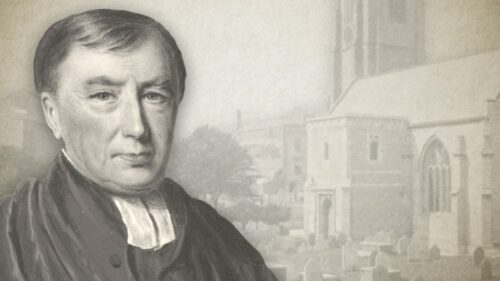
February 7—Morning Devotion
“Behold the Lamb of God!”—John 1:36
Who is it calls upon thee, my soul, to this most gratifying and enriching of all employments? Is it not God the Holy Ghost, by the ministry of his servant John? And doth not God thy Father do the same by the ministry of his servant Isaiah, when be bids thee behold him in whom his soul delighteth? And is not Jesus himself calling, again and again, in the ministry of his word and ordinances upon thy poor forgetful heart, when he saith, “Behold me! behold me! look unto me, and be ye saved!” And wilt thou not obey the sweet and gracious calls, on which all thy present peace and everlasting happiness depend? Precious, precious Jesus! Yes, my Lord! I would, methinks, so look unto thee, and so behold thee, until my whole heart, and all its affections, followed my eyes, and left not a thought behind for a single object besides thee. I would eye thee, thou dear Redeemer, as the Lamb of God; both where thou once wast, and where thou now art, and follow thee whithersoever thou goest. I would behold thee, as the Lamb of God, set up in the decrees of eternity, from everlasting; for thou art “the Lamb slain from the foundation of the world.” I would behold thee, set forth in all the representations of thy redeeming blood, in the innumerable sacrifices of the law, and in the lamb of the morning, and the lamb of the evening, through the intermediate ages, to thy coming. I would behold thee, Oh thou unequalled pattern of excelling meekness! when, in the days of thy flesh, thou walkedst through the streets of Jerusalem; and when, as a lamb, thou wast led to the slaughter. I would eye thee, Oh thou Lamb of God, until my eye-strings could hold no longer, when as the Lamb of God, and my soul’s surety, thou didst hang upon the tree, putting away sin, and satisfying divine justice by, the sacrifice of thyself. And never would I take off my eyes from thy cross, until called by thee to behold thee as a Lamb in the midst of the throne, where thou art feeding thy church above, and dispensing blessings to all thy church below. Yes, yes, blessed triumphant Lamb of God, thou art the Lamb still. Change of place hath made no change in thy nature, or thy love, or the efficacy of thy redemption. Thou still appearest as a Lamb that hath been slain. And still thou bearest on thy glorified body, the marks of my redemption. Shall I not behold thee, then, dearest Jesus? Shall I not unceasingly behold thee, thus called upon by the Father, Son, and Spirit, and thus finding every thing that can satisfy my most unbounded desires for time and for eternity? Help me, blessed Jesus, so to look, and so to live upon thee; and Oh, do thou behold me, and bid me live, and make me thine for ever.”
Robert Hawker (1753-1827) was an Anglican (High-Calvinist) preacher who served as Vicar of Charles Church, Plymouth. John Hazelton wrote of him:
“The prominent features…in Robert Hawker's testimony…was the Person of Christ….Dr. Hawker delighted to speak of his Lord as "My most glorious Christ.” What anxious heart but finds at times in the perusal of the doctor's writings a measure of relief, a softening, and a mellowing? an almost imperceptible yet secret and constraining power in leading out of self and off from the misery and bondage of the flesh into a contemplation of the Person and preciousness of Christ as "the chiefest among ten thousand and the altogether lovely." Christ and Him crucified was emphatically the burden of his song and the keynote of his ministry. He preached his last sermon in Charles Church on March 18th, 1827, and on April 6th he died, after being six years curate and forty-three years vicar of the parish. On the last day of his life he repeated a part of Ephesians 1, from the 6th to the 12th verses, and as he proceeded he enlarged on the verses, but dwelt more fully on these words: "To the praise of His glory Who first trusted in Christ." He paused and asked, "Who first trusted in Christ?" And then made this answer: "It was God the Father Who first trusted in Christ."
Robert Hawker on the Biblical Covenants (Complete)
Robert Hawker's Poor Man's Morning Portions





